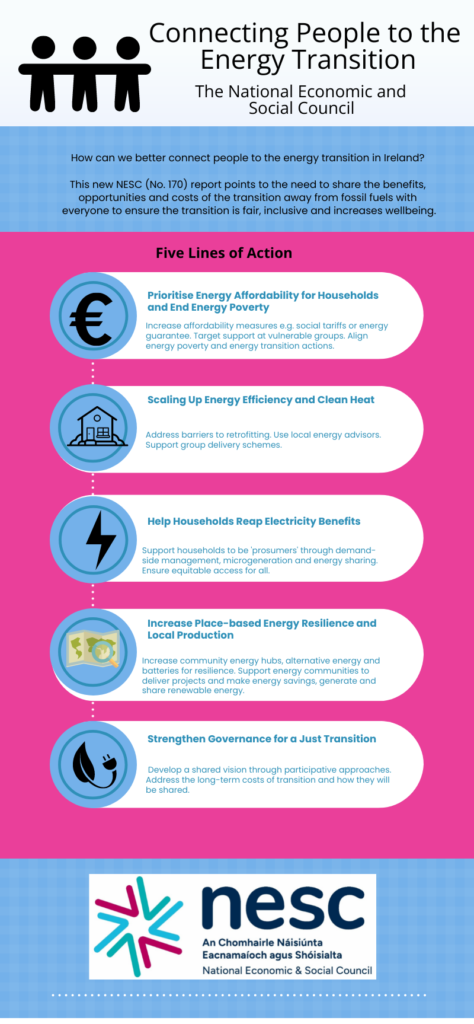You are here: Home > News & Events > Council Report No.170 – Connecting People to the Energy Transition
Council Report No.170 – Connecting People to the Energy Transition
- 12 August 2025
- Topics: Energy and renewables
- Types: Press Releases

Putting People at the Centre is Key to Ensure a Just and Fair Energy Transition
12th August 2025, Dublin, Ireland: A new report by the National Economic and Social Council (NESC) focuses on how to better connect people to a changing energy system so that it is just and inclusive.
Based on in-depth research and consultations with households, energy communities, policy makers and research experts, the Council finds that while the energy transition is technically underway, its meaning and impact for individuals, households and communities remains unclear. The Council argues that the specific ‘ask’ of the people in Ireland regarding the transition has yet to be clearly defined. It identifies a range of challenges to be addressed, including:
- Energy affordability and the persistent issue of energy poverty for vulnerable groups;
- Households face barriers to energy efficiency action including high upfront costs, complex grant processes, uncertainty and practical issues;
- Households are largely ‘in the dark’ about their energy use and are not yet benefiting from some of the new opportunities from electricity usage such as dynamic tariffs and energy sharing; and
- Extreme weather events are highlighting the need for energy resilience at a local level. Energy communities are being supported but are finding barriers to delivering projects to generate energy.
Speaking about the report, NESC Policy Analyst Dr Jeanne Moore said: “Individuals, households and communities can potentially play a very significant and immediate role in making energy savings, generating renewable energy and building energy resilience if enabled to do so. However, these opportunities and benefits are not yet available to all.”
To address this, the Council calls for a fundamental shift, urging policy and practice to place people firmly at the centre.
The Council outlines a range of actions, in each of these areas, to support a just energy transition. Placing people and their wellbeing at the centre of the energy transition can help to ensure the transition is just, fair, equitable, and inclusive.
The Council argues the success of Ireland’s energy transition hinges on deliberately strengthening various connections between people and the energy system. Key recommendations from the report include:
- Protecting Households and Ending Energy Poverty: Safeguards for affordability and wellbeing must be prioritised to protect households, particularly vulnerable groups, from price volatility and energy poverty. An integrated approach is needed to make ending energy poverty a priority.
- Strengthening Governance for a Just Transition: This requires further engagement, collaboration and potentially developing a shared vision or “galvanising mission” through participative approaches. Addressing the long-term costs of the transition and how they will be shared is crucial and requires a clear approach beyond consumer bills.
- Barriers to Clean Heat and Energy Efficiency Need to be Addressed: Scaling up energy efficiency and transitioning to clean heat (like heat pumps and district heating) requires addressing barriers needed to support increased uptake. Leveraging social and behavioural insights to make energy efficiency simpler, using trusted messengers and local leaders, and supporting group delivery schemes (such as Solar Meitheals) are required.
- Households Can be Active Participants: Households can become more active participants (“energy citizens” or “prosumers”) through demand-side management, microgeneration, and energy sharing. Increased measures to ensure equitable access for all could be supported by secure application of digital/AI technologies.
- Building Local Energy Resilience: A regional/local approach, involving local authorities and communities, can enhance local energy resilience and support decarbonisation. Building local energy resilience can be enabled through use of batteries and resourced community hubs.
- Energy communities Can Play a Key Role: There are growing numbers of energy communities in Ireland, and they want to do more. Addressing barriers, measures should expand ownership models (e.g., co-ownership with developers or potentially with public bodies/local authorities), provide better early-stage funding, supporting communities to act as intermediaries for households, and facilitate their role in local heat generation (biogas, district heating) and energy sharing.
On the publication of the report, Dr Larry O’Connell, Director of NESC, added that: “The Council believe that strengthening the connection between people and the energy transition is essential for a just, inclusive, and wellbeing-focused outcome. Putting people at the centre, ensuring affordability, fostering local action and resilience, and supporting communities are essential for a successful and just transition that benefits all. This involves equitable sharing of costs and benefits, protecting vulnerable groups, and fostering collaboration across society.”
This report is the third to be published in 2025, from a body of work on the topic of energy policy.
To read the report in full please click here.
ENDS
For further information, contact:
Marie Lynch, Carr Communications,
e: marie@carrcommunications.ie | m: 087 973 0522


